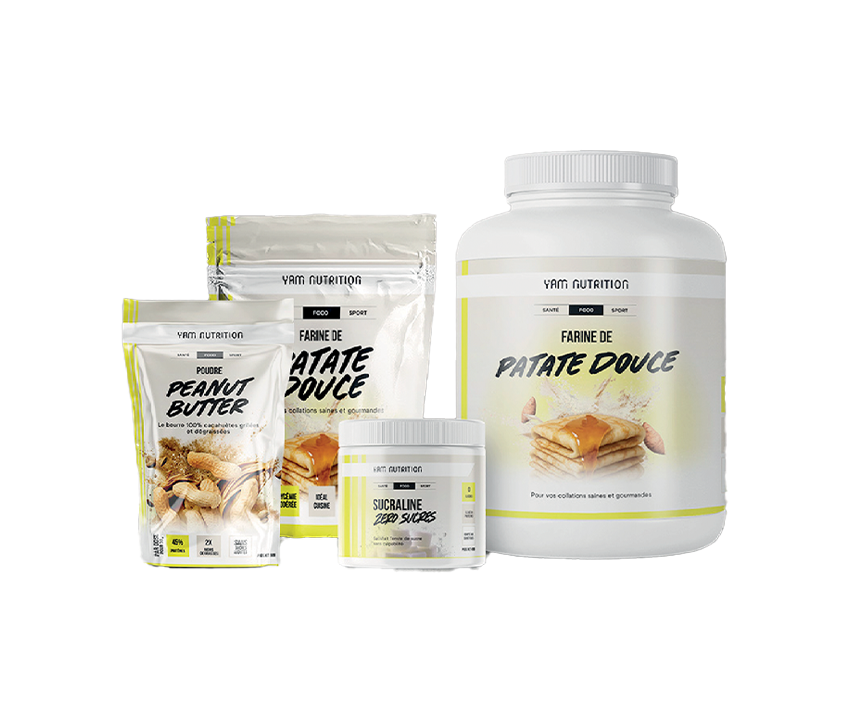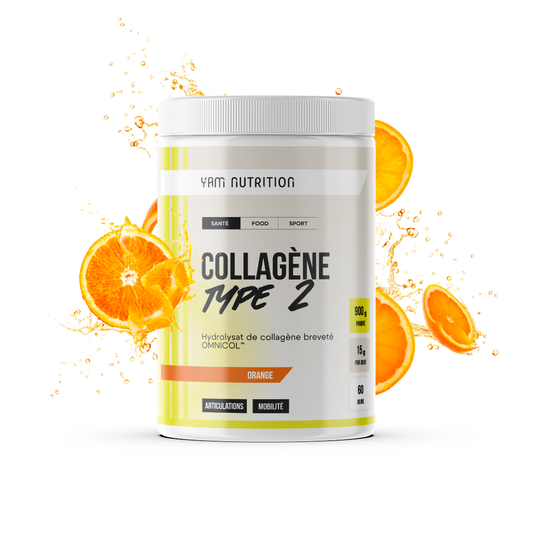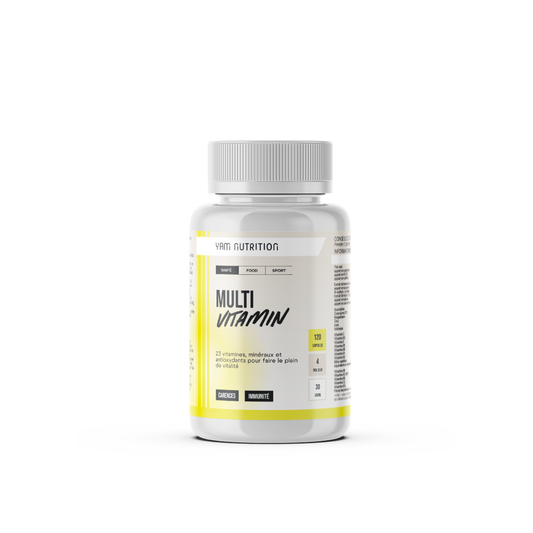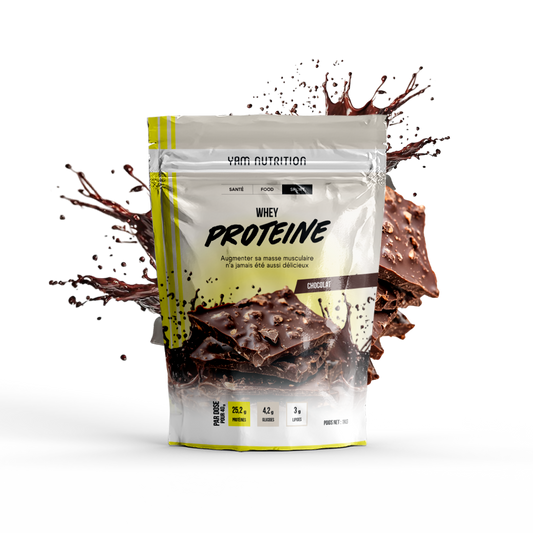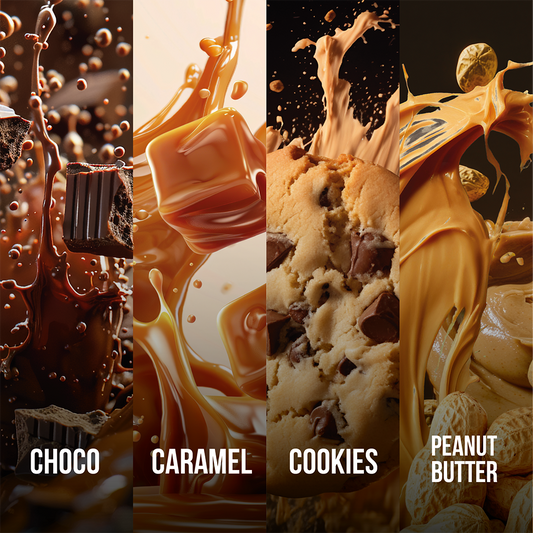Proteins and your diet

Sommaire
- Food helps build your own protein in muscle fibers
- Which dietary proteins are most effective at stimulating muscle growth?
- Animal protein contributes to your essential amino acid intake
- Plants are also very good sources of amino acids
- Your protein nutritional needs and your diet, depending on your sporting activity
Muscle building and protein are linked, although most exercisers never really know why. What you need to know is that protein, and especially the amino acids it contains, contributes to your muscle metabolism in several ways. In fact, your muscles are made up of 25% to 30% protein , 2% glycogen and a majority of water, fluids and various others nutrients . And while you might think 25% amino acids is a pretty low number, it actually makes all the difference since it's your fiber itself.
Indeed, muscle hypertrophy (muscle gain) requires the use of certain amino acids and energy provided by carbohydrates or fats. Your muscle fibers themselves, actin, heavy chain myosin, and titin, are made of protein. Furthermore, some of these amino acids are only metabolized at the muscle fiber level, before passing through the liver. This is the case for BCAAs, the famous branched-chain amino acids Leucine, Valine, and Isoleucine that you are familiar with.
OMNICOL™ Patented Collagen Hydrolysate A complex of 23 vitamins, minerals and antioxidants to boost your vitality Building muscle mass has never been so delicious
Collagen Type 2 Powder
Sale price
49,90 €
Multivitamin
Sale price
29,90 €
Whey Protein
Sale price
From 37,90 €
Food helps build your own protein in muscle fibers
To put it simply, let's say that the proteins present in your food will be broken down into amino acids and peptides by digestion and that these will then be reassembled into peptides and proteins according to the needs of your body. It is more or less a Lego game by deconstruction and construction where these processes are played by enzymes. Let us add that these processes of decomposition and reconstruction from the same elementary bases will reform peptides, proteins, peptide hormones and many other molecules linked to amino acids.
All of your tissues, including muscle tissue, will be replenished in the presence of amino acids. For example, for collagen with Glycine, Proline and Lysine, collagen being a structural protein found practically everywhere in your body. Let's add that each amino acid will have several roles to play in your body, at the cellular or organic level. Regarding the fibers of your muscles, amino acids also play an important role. And To stimulate muscle gain after weight training, protein must be present in sufficient quantities in your diet .
Which dietary proteins are most effective at stimulating muscle growth?
You've probably heard about complete and incomplete proteins in your food. In fact, your food contains complete proteins when it contains all 9 amino acids that your body cannot synthesize on its own. These are the branched-chain amino acids Valine, Leucine , Isoleucine as well as Tryptophan, Methionine, Lysine, Phenylalanine, Threonine and Histidine. In general, complete proteins also contain a significant proportion of non-essential amino acids. Essential and non-essential amino acids make up an aminogram, the set of amino acids in a protein.
Conversely, many plants lack one or more essential amino acids, making them poor candidates for muscle growth. However, some plant-based proteins are as good as most animal proteins. (soy protein, quinoa, peas, lentils, etc.). But whatever your food choices, make sure you get at least 30 to 40 grams of protein per meal. As long as the proteins are complete, meaning they contain all the essential amino acids in sufficient quantity (including BCAAs and leucine), they will support muscle growth, whether they are of animal or plant origin. We then talk about the aminogram of protein foods, consisting of the relative balance between each amino acid.
Animal protein contributes to your essential amino acid intake
Animal protein may be ideal for humans because animal flesh—their muscle tissue—necessarily contains all eight essential amino acids. Indeed, their muscle tissue is essentially identical to ours. Generally, beef protein is highly valued by bodybuilders and athletes because beef is a good source of absorbable iron, heme iron. It is also an excellent source of creatine, with beef containing about 4.5 grams per kilogram.
Chicken and turkey are also popular with strength athletes, as they are among the most commonly consumed animal proteins. We often find that most foods rich in good sources of fat, such as oily fish (salmon, sardines, etc.) and eggs are also good sources of protein. In terms of balance, the whole egg represents the benchmark for protein bioavailability, with a score of 100. This figure is based on a particularly well-balanced amino acid profile and a high level of leucine.
Plants are also very good sources of amino acids
Some sources of Plant protein , including peas, quinoa, red lentils, soybeans and some other plant sources or certain cereals also contain a significant amount of amino acids. From a strictly physiological point of view, your body does not differentiate between an amino acid of animal or plant origin. Only the relative balance between amino acids (aminogram and nitrogen content) will make the difference in terms of assimilation. Relatively speaking, think that sources of vegetable proteins are also rich in micronutrients, minerals (magnesium, calcium, potassium, etc.), trace elements (but rarely iron) and vitamins (but poor in vitamin B12 ). Naturally, foods rich in plant proteins are also good sources of carbohydrates and fiber for most of them.
Plant-based antioxidants also present a phenomenal variety, essential for human health. Plants therefore contain more fiber, which means that the proteins they contain will be a little less well absorbed. Vegetarians know this very well and generally consume more protein-rich plants in order to obtain an adequate daily quota. Let's say that for omnivores, the amount of protein from plant sources is not negligible if their diet is sufficiently varied and balanced.
Your protein nutritional needs and your diet, depending on your sporting activity
When it comes to bodybuilding , we would tend to advise you a nutritional intake of 35% protein compared to the other two macronutrients, carbohydrates and fats. Make sure to provide your body with 35 to 50 grams of protein per meal (over 4 meals a day) and you will reach a sufficient protein quota. The only limitation to protein assimilation is given by your physical condition and your age. The older you are, the more your body will need protein sources to maintain the regeneration of muscles and organic tissues. A protein shake will provide a protein supplement to your nutritional intake, with an extra dose of enjoyment too.
When it comes to endurance sports, it's estimated that protein should account for 20 to 25% of your daily calorie intake . Again, there's nothing to force or prevent you from taking a protein shake after your workout. It helps with post-exercise recovery while also helping maintain muscle mass. However, consider protein supplements for what they are: supplements to your diet, which should already contain enough protein.
Eric MALLET
Spécialiste en Nutrition Sportive
